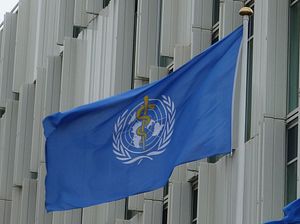In a joint press conference on February 9 after a fact-finding tour of Wuhan, health experts from China and the World Health Organization suggested that the coronavirus (SARS-CoV-2) may have originated outside of China, possibly entering the country on frozen meat, and that its emergence from the Wuhan Institute of Virology (WIV) was “extremely unlikely.”
A research team made up of 17 Chinese and 17 international members representing 10 other countries carried out a study from January 14 to February 10 in Wuhan. Among its most important findings was that available information “indicates the possibility of the missed reported circulation in other regions,” according to Dr. Liang Wannian, Chinese lead on the fact-finding delegation. “These so-called ‘omissions’ are strongly linked to the characteristics of the disease and its virus. We have reached this basic judgment after a review of the global data and relevant literature of the global research community,” he continued.
Additionally, the team found that although most viruses come from animals, they have yet to identify the “reservoir” of animal hosts for SARS-CoV-2. The issue of an animal reservoir is critical for the world to be able to stop or limit future zoonotic viral transfer to humans. Chinese leaders, I suspect, sees this facet as even more crucial. Should no animal host be found, it could point fingers back at the WIV and Beijing.
Dr. Peter Ben Embarek, the WHO delegation lead, gave the WHO’s imprimatur to these findings at the press conference, further stating “It is very unlikely that anything could escape from such a place [as the Wuhan lab].” His team was reassured upon hearing of the lab’s “biosafety protocols.” Embarek also gave a nod to Beijing’s extraordinary theory of that the coronavirus may have been introduced to China on frozen meat packaging.
However, there are factual issues with such statements. By Beijing’s own statistics, coronavirus cases spiked in China over a month before Italy and Spain, the next two deeply affected countries. Moreover, uncritically accepting the statements of Chinese bureaucrats of their adherence to protocol is perilous in the best of cases. And it is particularly notable that WHO and others have consistently downplayed the “cold chain” as a likely source of transmission. As China watcher Bill Bishop recently explained, “If China can get the WHO to sign off on [cold chain transfer] it will give a massive boost to the intensifying efforts to claim the virus originated anywhere but China.”
Previously denied entry to the People’s Republic (see here and here), it appears this WHO team has paid a high price for its current access, putting its very credibility in jeopardy. Such missteps are a chronic danger for those unfamiliar with China. Beijing’s sense of exceptionalism can place tremendous pressure on interlocutors to accommodate its expansive desires.
Indeed, access can be particularly rewarding within Chinese society, but it has to be under proper circumstances. An international organization like the WHO that relies on its objectivity must be far more cautious in its language concerning the People’s Republic. Allowing China to play by different rules without erecting barriers against its “United Front” disinformation effort has repeatedly put the WHO in an awkward position.
To maintain objectivity, the WHO must contend with the fact that Chinese government-supplied information is simply not reliable. To base factual findings solely on the word of China’s government places an unwarranted degree of trust in a system which Xi Jinping has remade into a totalitarian state. Xi’s China suffers no criticism within its own borders and attempts to stifle it worldwide. The only remaining check on China’s disinformation comes from the outside world. In health issues this responsibility falls first to the WHO.
This is not to excuse mishandling of the COVID-19 crisis elsewhere, but China is the only major country that has blatantly lied and covered up the pandemic, as seen in the example of the late Dr. Li Wenliang and comments from Wuhan’s former mayor Zhou Xianwang (although his interview has since been removed, you can view a version on the Wayback Machine here). Even now, Beijing is openly and obviously attempting to lay the blame anywhere but China.
Most world governments are able to accept that diseases might originate within their own borders without it necessarily being a critique on them. But Beijing’s chauvinistic nationalism will not brook even slight embarrassment, much less criticism that its totalitarian regime played a key role in the spread of COVID-19. Note in particular that this holds true regardless of whether the virus originated in China, another country, or even in the WIV.
Much has already been made of the possibility China’s undue influence over the WHO. Indeed, Beijing seems to have played some role in securing Dr. Tedros’ position as WHO director general in 2017. The year prior, the WHO removed Taiwan from its observer status at Beijing’s request. During the pandemic, this exclusion from the WHO has meant willfully endangering the lives of Taiwan’s 24 million citizens. Supporting Xi Jinping’s revisionist geopolitical aims hardly seems an acceptable justification.
Public health is a public good. It falls to public health experts and agencies to protect the public from the politicization of health. A step in the right direction for WHO would be to insist on Taiwan’s immediate reinstatement as an observer. This is well within its power. China may object or even withdraw, but it has no right to threaten others’ health.
In light of substantial evidence that Xi is committing genocide and other atrocities, the WHO must ask itself very seriously if its access to China is worth its credibility.

































